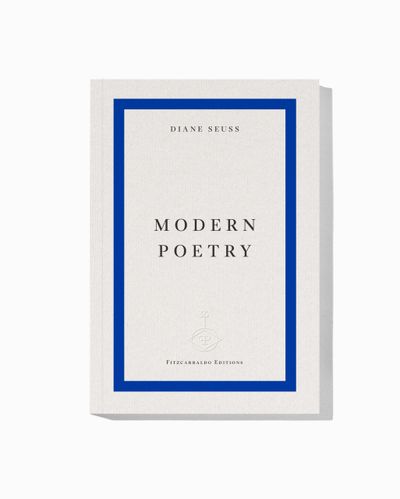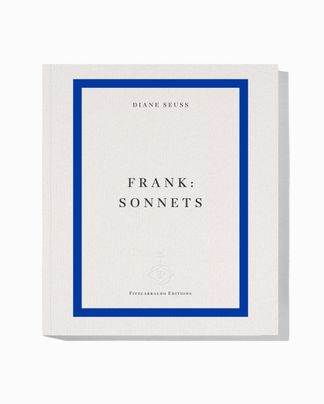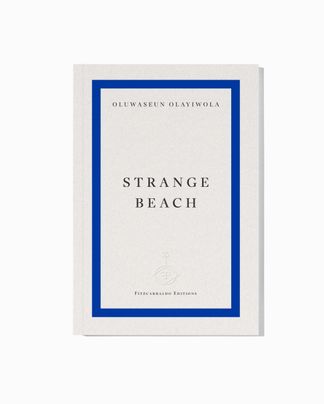Diane Seuss’s signature voice – audacious in its honesty, virtuosic in its artistry, outsider in its attitude – has become one of the most original in contemporary poetry. Her latest collection takes its title, Modern Poetry, from the first textbook Seuss encountered as a child and the first poetry course she took in college, as an enrapt but ill-equipped student, one who felt poetry was beyond her reach. Many of the poems make use of the forms and terms of musical and poetic craft – ballad, fugue, aria, refrain, coda – and contend with the works of writers overrepresented in textbooks and anthologies and those too often underrepresented. Seuss provides a moving account of her picaresque years and their uncertainties, and in the process, she enters the realm between Modernism and Romanticism, between romance and objectivity, with Keats as ghost, lover and interlocutor. In poems of rangy curiosity, sharp humor, and illuminating self-scrutiny, Modern Poetry investigates our time’s deep isolation and divisiveness and asks: What can poetry be now? Do poems still have the capacity to mean? ‘It seems wrong / to curl now within the confines / of a poem,’ Seuss writes. ‘You can’t hide / from what you made / inside what you made.’ What she finds there, finally, is a surprising but unmistakable love.

Modern Poetry
French paperback with flaps, 128 pages
Published 13 February 2025
Modern Poetry
0
LITTLE FUGUE STATE
Far have I wandered not knowing
the names of where,
long have I woven this dress
of human hair, here
I have pitched my tent, here and there,
not knowing my name,
or where, not even the color of my hair
nor why
it tangles so, nor where my comb goes,
nor where my brush,
how far I wandered through underbrush,
into onrush,
nor where my body was, nor what it called
itself, nor the nature
of my calling, nor what my scrawling meant,
not that scrawl then,
nor this scrawl here, nor what a self
could be,
nor what a bee could be, nor breath,
nor poetry,
this dog I’ve walked and walked
to death.
CURL
No longer at home in the world
and I imagine
never again at home in the world.
Not in cemeteries or bogs
churning with bullfrogs.
Or outside the old pickle shop.
I once made myself
at home on that street,
and the street after that,
and the boulevard. The avenue.
I don’t need to explain it to you.
It seems wrong
to curl now within the confines
of a poem. You can’t hide
from what you made
inside what you made
or so I’m told.
BALLAD
Oh dream, why do you do me this way?
Again, with the digging, again with the digging up.
Once more with the shovels.
Once more, the shovels full of dirt.
The vault lid. The prying. The damp boards.
Mother beside me.
Like she’s an old hat at this.
Like all she’s got left is curiosity.
Like curiosity didn’t kill the cat.
Such a sweet, gentle cat it was.
Here we go again, dream.
Mother, wearing her take-out-the-garbage coat.
I haven’t seen that coat in years.
The coat she wore to pick me up from school early.
She appeared at the back of the classroom, early.
Go with your mother, teacher said.
Diane, you are excused.
I was a little girl. Already a famous actress.
I looked at the other kids. I acted lucky.
Though everyone knows what an early pickup means.
An early pickup, dream.
What’s wrong, I asked my mother. It was early spring.
Bright sunlight. The usual birds.
Air, teetering between bearable and unbearable.
Cold, but not cold enough to shiver.
Still, dream, I shiver.
You know, my mother said.
Her long garbage coat flying.
There was a wind that day.
A wind like a scurrying grandmother, dusting.
Look inside yourself, my mother said.
You know why I have come for you.
And still I acted lucky. Lucky to be out.
Lucky to be out in the cold world with my mother.
I’m innocent, I wanted to say.
A little white girl, trying out her innocence.
A white lamb, born into a cold field.
Frozen almost solid. Brought into the house.
Warmed all night with hair dryers.
Death? I said. Smiling. Lucky.
We’re barely to the parking lot.
Barely to the car ride home.
But the classroom already felt like the distant past.
Long ago, my classmates pitying me.
Arriving at this car full of uncles.
Were they wearing suits? Death such a formal occasion.
My sister, angry-crying next to me.
Me, encountering a fragment of evil in myself.
Evilly wanting my mother to say it.
What? I asked, smiling. My lamb on full display at the fair.
He’s dead! my sister said. Hit me in the gut with her flute.
Her flute case. Her rental flute. He’s dead!
Our father.
Our father, who we were not supposed to know had been dying.
He’s dead! The flute gleaming in its red case.
Here, my mother said at home.
She’d poured us each a small glass of Pepsi.
We normally couldn’t afford Pepsi.
Lucky, I acted.
He’s no longer suffering, my mother said.
Here, she said. Drink this.
The little bubbles flew. They bit my tongue.
My evil persisted. What is death? I asked.
And now, dream, once more you bring me my answer.
Dig, my mother said. Pry, she said.
I don’t want to see, dream.
The lid so damp it crumbled under my hands.
The casket just a drawerful of bones.
A drawerful. Just bones and teeth.
That one tooth he had. Crooked like mine.
(…)
‘Alongside Terrance Hayes, Diane Seuss has a strong case to be considered as the most influential American poet of the last 10 years. A former social worker, over six collections she has become renowned for her fearless excavation of her life in her work…. With her formidable voice, Seuss is one of the most important poets writing now.’
— Rishi Dastidar, Telegraph
‘In its unpredictability and honesty, Modern Poetry is an inspiration.’
— Graeme Richardson, The Times
‘I fear that, like Seuss’s first poetry teachers, I may have made Modern Poetry sound too austere. The fight with form is also on behalf of a wildness and richness of life as well as motif. Constraint (poetic or economic) is countered with the pure hedonism of neglected communities and micro-scenes.’
— Brian Dillon, 4Columns
‘The way in which Seuss interrogates longing, nostalgia, memory, loss, relationships makes plain she is someone who has been around the block enough times that we should pay attention.’
— Diana Arterian, Literary Hub
‘Here at the bedside of this dying world, Diane Seuss is one of the exemplars of our modern poetry, and Modern Poetry is a resounding, enduring and yes, beautiful companion.’
— Mandana Chaffa, Chicago Review of Books
‘One of the US’s most radical and important poets has finally found a home in the UK…. Seuss’s writing bristles with irreverent humour and wily energy.’
— Rebecca Tamás, Guardian
‘These are poems soaked with grief, nostalgia and memory, but also wary of all three of these as a kind of dangerous luxury…. And yet “Diane” keeps remembering, in such vivid, evocative detail. How devastating is “Bluish”, which begins with the purchase of a blue knife and ends with a description of the inside of an ambulance as: ‘bright / white as wedding cake / as school glue’. All the speaker’s education – her childhood and adulthood – have somehow led her here.’
— Clare Pollard, Poetry Society
‘These poems are taut and careful glimpses into a life lived on the fringes but threaded with wildness; there is a constant sense that everything they contain might erupt at any moment…. If autobiographical writing is an attempt to fix a life inside language, frank: sonnets and Modern Poetry are both convincing arguments for the absolute impossibility of ever really succeeding in doing so. Instead, they offer an alternative: debris, glimpses, constellations, ghosts. Suffering and all its attendant bewilderment is given the space it deserves, and pleasure, transcendence, and love are all given due space alongside it.’
— Maija Makela, Stinging Fly
‘A thrilling exploration of metapoetics – a symphony of language where the poems, deeply aware of themselves, facilitate Seuss’ ferocious interrogation of her own proximity to art but also move through form, beyond inherent human defensiveness, to embody a new more open-hearted definition of love…. Modern Poetry is a fascinating personal anthology of the poets and poems that have shaped Seuss’ moving and arresting thematic vision and in it she firmly positions herself as one of the most original of the modern poets writing today.’
— Victoria Kennefick, Poetry Book Society Recommendation
‘Diane Seuss’s superb Modern Poetry is no mere survey; it’s a full-frontal seminar on the subject. In these forty-one fiery poems, Seuss takes a deep dive into our inheritance from the Romantic and Modernist lyric poets, like Keats and Hopkins, through Stevens and Plath, “the final modern poet.” Her sizzling (and often funny) task is to insist on the radical differences she savours from those earlier custodians of the melancholy sublime, where Beauty was writ large and meaning can still seem like an academic exercise – or mere fog. The truth in Seuss’s world is gritty, with dirt on its hands, determined by a self-assertive resistance to the Romantic ideal. For every “Aria,” “High Romance,” and “Villanelle,” she counters with a “Cowpunk” and “Little Fugue with Jean Seberg and Tupperware.” She shows us that class, region, race, gender – those identifying features – are not things to be solved or resolved in some transcendental razzmatazz but accepted, embraced. Seuss exposes the falsity of idealized love, of academic coziness, and the grandeur of sublimity by a self-deprecating humor that morphs time and again into a wily, powerful, self-valuing gift.”
— David Baker, author of Whale Fall
Diane Seuss is the author of six books of poetry, including Modern Poetry; frank: sonnets, winner of the Pulitzer Prize, the National Book Critics Circle Award, the Los Angeles Times Book Prize, and the PEN/Voelcker Prize; Still Life With Two Dead Peacocks and a Girl, a finalist for the National Book Critics Circle Award and the Los Angeles Times Book Prize; and Four-Legged Girl, a finalist for the Pulitzer Prize. She was a 2020 Guggenheim Fellow, and in 2021 she received the John Updike Award from the American Academy of Arts and Letters. She lives in Michigan.


